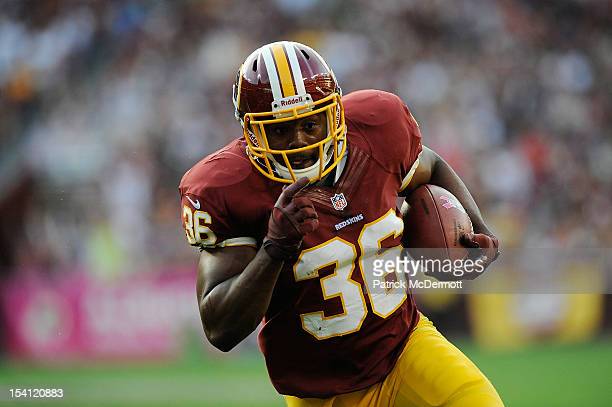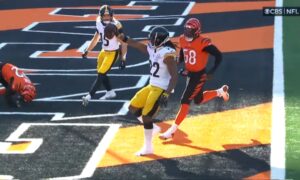For Darrel Young, finding his passion was easy. That was football. He parlayed that into a six-year career as a NFL fullback. But when that career ended, and they all do, he had to figure out what came next.
“It was the hardest shit I ever did in my life.”
Young began playing football when he was six. A terrific athlete growing up, football was his passion but he succeeded in everything. He was part of the track and field team. His high school basketball team became regional champs, knocking off LeBron James’ squad. But football was the ticket for his future. Young committed to Villanova, arriving as a linebacker and later moving to safety.
Undrafted, no NFL team offered him a contract. Only one club even game him a chance. Washington extended an invite to rookie minicamp. There, Young caught the eye of special teams coordinator Danny Smith, who persuaded the front office to sign him. He still remembers the moment.
“I’m doing a punt drill,” Young tells me in an interview last week. “I was doing a stab move and I kept bringing my arm back to my body. [Smith] was like, ‘hey, this is a grown ass man league. Why do you want to let a guy get into you? You’re not going to get him off of you in this league. That shit is going to work in a I-AA school but it isn’t going to work here.”
Message received. Young cleaned things up the next day and with his improved technique, beat first-round pick OLB Brian Orakpo in a punt drill.
“The next day he’s like, you’re coachable. So I did a punt drill. Me and Brian Orakpo. They drafted him that year. I knew I was faster but he was Orakpo. So I took my chance. We did a one-on-one punt drill and I ended up spearing the running back who was back there fielding some punts. Knocked him out. [Smith] took me out of practice and signed me.”
That was only step one of a long journey. Young would be cut by Washington in September and spent six months out of the league. He worked at Finish Line to pay the bills. He kept training, hoping someone would call and keep his dream alive. The Redskins signed him after the season but Young needed a new path to stick on the roster. Head coach Mike Shanahan approached him heading into his sophomore season and told him there was one way of even having a prayer of making the team.
“I came back the first day of the offseason. Shanahan said, ‘we’ve got 13 linebackers, we’ve got one fullback. You ain’t making it as a linebacker. So here’s your shot.’ So I took it and the rest is history.”
Young made the team as the backup fullback behind Mike Sellers. But no one throws a party when you make it. On cutdown day, the best news is no news. A phone that stays silent. Because a phone call means coach wants your playbook. And that means you’re out of a job.
Young spent the next six years with Washington, 2010-2015. Primarily a lead blocker and special teamer, he still found the end zone 13 times. His first touchdown came in what looks like a forgettable game, a blowout loss to Philadelphia. But it was special for Young.
“My first touchdown was on my mom’s birthday. My brother was in Afghanistan. We were playing the Eagles on Monday Night Football. Michael Vick actually. They were beating us 35-0. I scored my first touchdown. My brother was watching in Afghanistan. And it was my mom’s birthday.”
Young caught a three-yard pass from former Eagle Donovan McNabb. Here’s the clip.
Young’s final year with Washington came in 2015. After spending a few weeks in Chicago the following offseason, Carolina briefly signed him for the 2017 summer. They told him he was going to make the team. An hour later, while Young was apartment hunting, they informed him that no, they weren’t, and yes, kindly hand in his playbook. San Francisco nearly signed him when FB Kyle Juszczyk got hurt, but that fell through too.
Already planning for what came next, Young began making the tough transition to beyond playing on Sundays.
“I applied to a position at the NFL office. A development program opportunity to learn the business side. So by the time I got to Maryland on the 95 [after the Panthers cut him] I was driving and typing up my resume. I submitted the application, called Troy Vincent, and said this is what I wanted to do.”
The day after the 49ers opting against signing him, the day Young knew his career was finished, Vincent called back. The league was hiring him to intern in their player relations department.
That was his calling. Serving, helping, and giving back.
“Server and a leader. That’s how I looked at myself. A guy who was always in the locker room, tending to guy’s needs. Understanding what you’re going to go through. If you’re cut, if you’re a starter, if you’re only playing special teams, I went through every emotion as a starter besides getting $100 million…I went through it all. I went through a breakup, stolen identity. I wanted to get in front of that in assist players. Not to tell them my story but to talk about best practices and how to get in front of some of those things.”
He did that through his new internship and outside community work. Last year, he spoke to his old high school team to offer his perspective during a difficult 2020. He brought former teammates, too, like wide receivers Santana Moss and Pierre Garcon.
“I just have a passion for giving back. I get so excited to give back to people. If a guy calls me and says I need to sit down [with you], I love that shit. I love it. I love when I feel like I can provide to someone.”
Despite the hardships Young experienced on and off the field, he credits his family for instilling in him his work ethic. A mindset of treat everyone the way you want to be treated. That mentality comes from his father.
“I watched my dad clean banks for 20 years. I watched the disrespect and when people came through, threw stuff on the floor. They way they talked to him, the way they looked at him. And I was with him a lot of times in high school. I would go from practice to clean a bank with him because he wanted to show me not necessarily that I can do better than that, because there’s nothing wrong with cleaning banks, but that he was going to do everything so that I didn’t have to feel that. Doing that with my dad and watching that, whenever I can be nice to people, serve people and treat people how they wanted to be treated, I love it.”
Young got serious about activism and community work with Washington when he noticed high-profile teammates doing their part to serve others.
“I watched Alfred Morris and RGIII go out and do events every week. Alfred Morris rushed for 1,600 yards his rookie year. And RGIII, everyone knows who RGIII is. I watched them go out there and give back. And I thought, why the hell am I not doing this? So I was already doing some things but I made it a weekly routine. Every Tuesday I had to be out there doing something.”
Young enjoyed his role in the league office. But it didn’t allow him to create personal connections with players. He wasn’t around players day in, day out. He would do events, give advice where he could, but he wanted to further his impact. When the Steelers’ job for Director of Player Development opened up, he jumped at the chance.
“The impact I could make with players is what intrigued me the most. The league level was great. I have no complaints about it. But the real impact is with a team because I can build relationships with these guys. And really be a resource in their lives and not someone who pops in four times a year.”
He applied and earned an interview with Mike Tomlin. It wasn’t their first meeting. Young reached out and made a connection years ago.
“Coach Tomlin and I have the same agent. So talk about relationships. A few years ago, he got to coach the Pro Bowl, the 2018 Pro Bowl. That was my first Pro Bowl working an event. And I said, what the hell, I’m going to say something to him. I said what’s up coach, my name’s Darrel Young. I just wanted to talk and say thank you. For paving the way, for what you’ve done for this game in ways you’ll never know. There’s always people watching you. That was our conversation. We talked about it in our interview.”
Tomlin remembered that encounter. When Young applied to the Steelers, Tomlin personally checked his references, talking with Troy Vincent about Young’s work for the league. It helped Tomlin and Vincent had a good relationship and Vincent recommended Young for the job. On May 3rd, the Steelers hired him.
The role of a Director of Player Development isn’t obvious in the title like a running backs coach or special teams coordinator. Simply put, their job is to work with players for any off-field problem or question.
“My mission is to serve, equip, empower. Three words. That sums up it all. The reason I live by that is because I’m always here to serve these guys. I oversee the rookie programming…I’m responsible for building that out for the Steelers. Anything that has to do with the player off the field that’s going to help in their personal and professional development, that’s me.”
On the field, the biggest adjustment for rookies is the speed of the game. Off the field, it’s handling finances. For most players, it’s an amount of money they’ve never been responsible before.
“People think that you’re a millionaire because you’re in the league and you’re in Madden. But they don’t realize practice squad guys don’t get paid the same as active [players]. And that number [salary] that you see? Cut it in half.”
Young has only been with the team for a few months. Much of it has been spent during down periods of the offseason. But he’s already impressed with the structure of the entire organization.
“This culture is different. Mike Tomlin is different. Art Rooney is different. From the way they communicate to the way they walk around the building. Mike Tomlin is a leader of men. It doesn’t get any more simple in that. He actually genuinely cares about people. Not saying that anyone doesn’t. But I’ve never seen people do it like him. I’ve never seen people do it like him.
Specifically, Young highlighted Tomlin’s knowledge of every single person inside the building. Players and staff.
“When I did the interview with him, he walked me down the whole roster. He told me about each player, not from an intrusive standpoint but about what he loves about each player. And their the family, ‘they grew up in this home and this is what they’ve done. This is how they’ve been the past few years.’ Everything to a T about that player. When I met that player, I felt like I knew him already.
“I’ll add this to it. He walked me around the building. He introduced me to every person in that building by first name and where they’re from, how long they’ve been in the organization. Not, ‘Oh, I think you’ve been here seven years. Andy’s been here for 16 years and this is what he does. He gave me the vision. He gave me the mission, the department and what they do. And every rookie that we drafted and free agent that we signed, he knew them to a T. ‘Hey, this guy has a three-year-old son. Lamont Wade has a three-year old son. Here’s what he did at Penn State, here’s his career stats.’ I’m like damn, it’s only been a week since you drafted these dudes. I’m like, I know this is your job but damn.”
For his NFL career, Young has come full circle. He’s back in the same building as the man who brought him into the league. Danny Smith, who signed him in Washington, now serves as the Steelers’ special teams coordinator. Smith had been trying to land him a job for a long time. Now the two are back together.
“Danny told me in 2016, come work for him and do the Bill Walsh Minority Internship. But I said, Danny, I’m not done yet. He was like, ‘you’re going to be done. But I’ll let you go.’ I played two more seasons. I stayed around for two more, But fast forward, when Tomlin told him that he was interviewing me, [Smith] stamped it. Before Tomlin even finished his sentence, he stamped it. He said, ‘Don’t say anymore. I signed that guy. I know who he is, bring him in. He’s gonna help us.'”
Finding his next job after his playing days might not have been easy for Darrel Young. For most players, it’s the hardest thing they do. But Young’s purpose has always been clear. To help, to give, to lead. He’s bringing all of those qualities to Pittsburgh.








